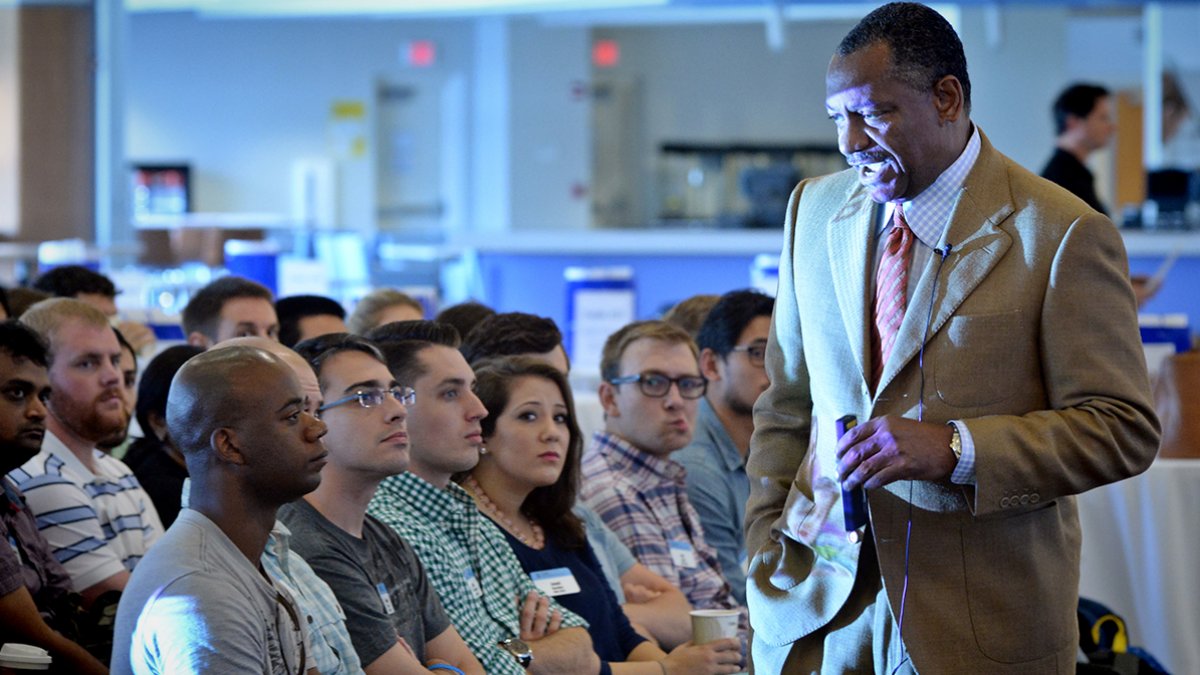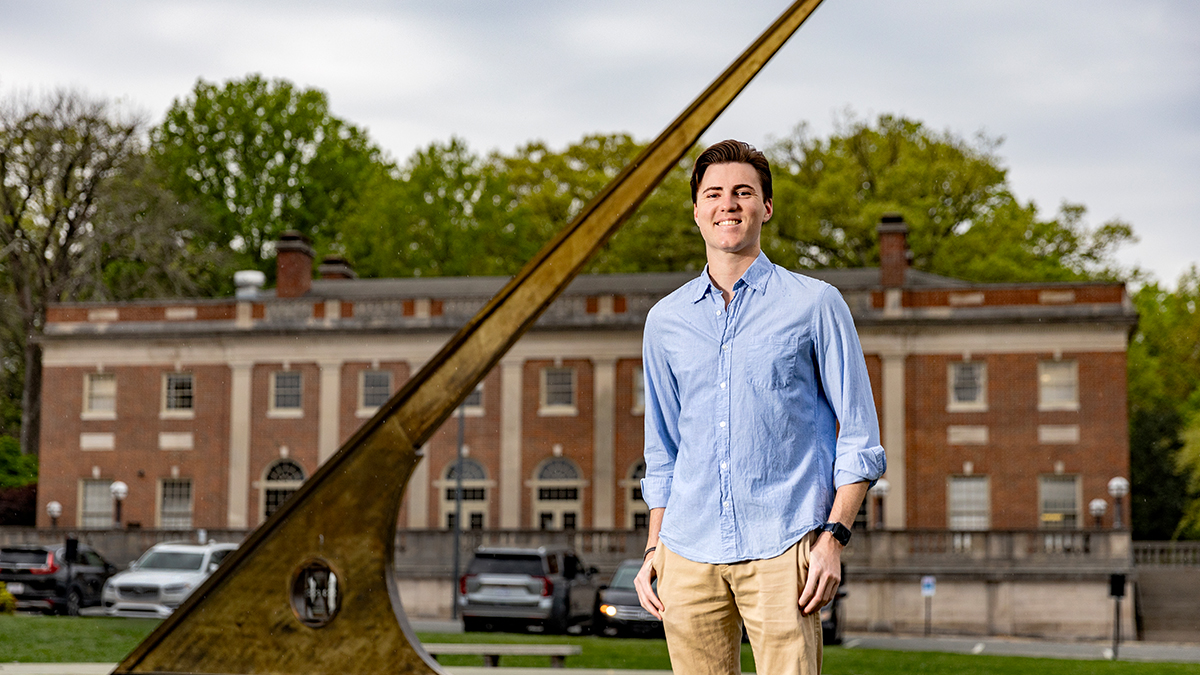Six questions with Commencement speaker James Johnson
The UNC Kenan-Flagler Business School professor discusses his work and offers advice for the soon-to-be graduates.

James H. Johnson Jr. is known for spreading the gospel – the gospel of disruptive demographics, that is. His groundbreaking research on the browning and graying of America has made Johnson a hot ticket among organizations eager for him to address the changes imperative to surviving and thriving in a world where change is the only constant.
Fast Companydubbed Johnson “a professor with an endowed chair at a leading business school, an expert on poverty and a tireless activist for social justice” – but wait, there’s more. The Farmville, N.C. native, who teaches strategy and entrepreneurship at UNC Kenan-Flagler Business School, also serves as the director of the Urban Investment Strategies Center in the Frank Hawkins Kenan Institute of Private Enterprise. A social entrepreneur and scholar, Johnson is passionate about using education to transform communities. He helped found the Global Scholars Academy in Durham to give children in the distressed urban neighborhood a brighter future.
We recently caught up with Johnson, who also serves as a senior research fellow at the Carolina Population Center and an adjunct professor of public policy, sociology and geography, as he prepared for Sunday’s Winter Commencement at UNC-Chapel Hill, where he will speak:
Why did you accept UNC’s invitation to speak at Winter Commencement?
I considered it an honor – to be asked signals that you’ve done something important. I’ve been in higher education for 30 years, focusing my work and research on the profound changes occurring in our economy and the population shifts we’re experiencing as a society. There are enormous implications for the business of higher education and our efforts to prepare the next generation – and succeeding generations – of talent to be successful in an economy where change is the only constant – and rapid change, at that.
In your opinion, what is the biggest challenge that graduates will face in their careers over the next five to 10 years?
We’re in an era of incredible demographic disruption – profound changes in the mix of our population – with an increasingly global economic system. The challenge for graduates is to understand how to thrive and prosper in the midst of this economic and demographic restructuring. I’ve focused my research on those two parallel tracks to determine what we really need to do as a university, given these changes, to make sure that the young people who graduate from Carolina are poised to be able to take advantage of opportunities, whether they go to work for a corporation, government, non-profit or become an entrepreneur.
With the U.S. economy recovering from the Great Recession, what does your research indicate about how the current state of the economy will impact graduates as they prepare to enter the workforce?
We’re slowly rebounding from the worst economic downturn since the Great Depression. Between 2007 and 2009, we lost 8.7 million jobs in this country and our unemployment rate skyrocketed to 10 percent in 2009, up from 5 percent prior to the onset of the recession in 2007. Economists told us in 2012 that we needed to create over 200,000 jobs every month over the next eight years to return to pre-recession employment levels and accommodate labor force growth. Over the past 12 months, we have met or exceeded this number. Our current unemployment rate is 5.8 percent – a six-year low that’s been characterized by some economists as ‘the new normal.’
But we’re also in the midst of a “white-collar recession.” Across the last three recessions, long-term joblessness – defined as being unemployed for six months or longer – increased more rapidly among people with some college, a bachelor’s degree or higher than it did among people with a high school diploma or less. As my grandmother used to say, “that’s bass-ackwards.”
The key takeaway is this: In today’s economy, just having a degree won’t guarantee you success. You have to have something else in your toolkit, too.
What can graduates do to navigate these challenges and strategically position themselves for success?
Our graduates are what employers need and are looking for. The liberal arts foundation we offer is core to developing the proper set of tools and skills that are required for graduates to thrive and prosper in today’s world, such as cultural elasticity and contextual intelligence. Ten years ago, we reinvented Carolina to be the ‘innovation university,’ with ‘intellectual entrepreneurship’ as our core operating principle. We really encourage students to think no small thoughts and give them the freedom to discover, innovate and be creative. Those are the hallmarks of success in the 21st century economy. We do it differently at Carolina, and that gives our graduates a competitive advantage in the marketplace.
Developing a personal brand is imperative to positioning yourself for success. Take time to reflect about what’s in your toolkit – in your portfolio of experiences, what enables you to add value to a business? Job applicants often use their past education or employment to define themselves – “I just graduated from UNC” or “I used to work at IBM.” That’s all well and good, but it tells employers nothing about what you bring to the table. At the end of the day, you must be able to communicate and convince employers that you add value to what they do. You have to lead with value add.
UNC emphasizes the importance of giving back to the community, something you’re very involved in as the founder of the Global Scholars Academy in Durham. How can graduates continue this proud tradition of community service after they leave Chapel Hill, and why is it important that they do?
Most people frame giving back as a social or moral thing – it’s the right thing to do. I was raised on those principles and firmly believe in them. But today, particularly given the demographic shifts we find ourselves in the midst of, we must make the business case for giving back for it to get people’s attention.
In our recovering economy, 53 percent of college-educated young people under the age of 25 are unemployed or underemployed. This is a situation we haven’t been in before and people are, understandably, focused on their own self-interest. But if we don’t invest in the young children that are the next generation, we are going to be in big, big trouble.
The next generation has to literally propel our nation. And if you look at the large number of kids we’re leaving behind, it’s clear they are not being very well educated. Many people think they don’t have a dog in the K-12 education fight. Recent graduates may not think it’s their issue if they don’t have children yet. And there’s an entire generation of “aging empty-nesters” who don’t think it’s their issue because their kids are no longer in school.
Our biggest challenge is to get everyone to understand that they do have a dog in the fight. We all do – for the future competitiveness of our nation. We need the next generation of talent to be welleducated and trained. So yes, giving back is socially and morally the right thing to do – but it’s also enlightened self-interest. We need to be mindful that for whom much is given, much is expected.
What is the most important piece of advice you would like to share with graduates?
As a Carolina graduate, you have an abundance of skills in your toolkit that will enable you to find success in today’s hyper-competitive global economy. Create a lifelong learning mindset that enables you to continue to hone your contextual intelligence, leverage your entrepreneurial acumen and refine your brand.




